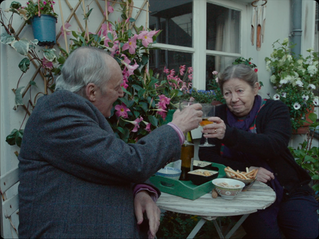Knives Out: A Keen Look at Contemporary Costume
- Kirby Moore
- Aug 29, 2020
- 4 min read
Updated: Oct 28, 2020
When people hear ‘costume’ they tend to think first of historical clothing, fancy dress and theatrical attire; however, let’s not forget the thousands of films and television programs featuring actors wearing contemporary, everyday clothing, i.e. costume. A perfect example of this is Rian Johnson’s Knives Out (2019), a contemporary play on the classic whodunit murder mystery, for which costume designer Jenny Eagan (Maniac, Catch-22), won a Costume Designers Guild Award for ‘Excellence in Contemporary Film’.
The film centres around the apparent suicide of the Thrombey family patriarch, and the ensuing investigation in which it is revealed that - as in most intricate murder mysteries - every character has both a motive and an alibi. It is then up to private detective Benoit Blanc to solve the mystery, while the audience endeavours to keep up with the convoluted string of lies, misdirects and red herrings.

Cover of Knives Out (2019)
The first impression of the film is through the image – and concurrently the costumes - on the cover. The characters have seemingly been designated a colour, and are pictured wearing these (largely bold) colours in a way that is distinctly reminiscent of the classic board game, Cluedo. This was done on instruction of director Rian Johnson, who, Eagan revealed, wanted "to make each character as distinct as a [Cluedo] character but with some version of modern dress". Eagan achieves this perfectly, the film presents an array of delightful costumes, including the bold, monochromatic looks worn by Linda (Jamie Lee Curtis), Richard’s (Don Johnson) consistent donning of neck-zip jumpers, and Joni’s (Toni Colette) fussy florals.
Arguably, the most notable costuming feature in Knives Out is that, combined, the cast wears enough knits to make the film the only source of inspiration for 21st-century jumpers and cardigans that a person could possibly need. The audience is given a variety of garments to consider; Jacob’s (Jaeden Martell) obnoxious varsity-esque pullover, Richard’s old-timey argyle jumper, Marta’s (Ana de Armas) numerous knits (special mention goes to her ribbed, lavender cardigan), and of course, Ransom’s (Chris Evans) array of rather fabulous jumpers. In fact, Ransom’s jumpers are one of the most interesting topics of costume conversation. While some of the characters’ costumes have certainly experienced some general wearing down (Marta’s shoes for example), Ransom’s various knits are the only items of clothing that have sustained obvious damage. This damage is mostly visible on the hems, cuffs and collars of the respective jumpers, but the generally adored cable knit jumper is especially worn, boasting extra holes and unravelling yarns.

Stills from Knives Out (2019)
This clear neglect of his attire provides an interesting juxtaposition to the upper-class air of Ransom’s character and expensive lifestyle, which would seem to preclude him owning such clothing. On any other character the weathered jumpers might give the appearance of dishevelment or general scruffiness; however, on Ransom, who coasts around in a vintage BMW and inhabits a fifties modernist mansion, the damage sported by these jumpers gives the distinct impression of carelessness, disregard and privilege. Even the colour of Ransom’s cable knit pullover (an off-white) denotes privilege, recalling a particular 1950s, spends-his-weekends-at-the-country-club-in-a-sweater-vest-and-loafers feeling of leisure and luxury. Despite Ransom’s character being initially presented as a supportive, as the storyline progresses, Ransom’s cosy jumpers are revealed to be at odds with his arrogant demeanour.
Costumes in a murder mystery can’t be discussed without looking at the clothing worn by the lead detective, in this case the Poirot-cum-Sherlock character of Benoit Blanc. Detectives in film and television are often synonymous with smart tailoring and two piece suits, which is reflected in Detective Lieutenant Elliot’s (Lakeith Stanfield) wardrobe, who sports a coat with sharp shoulder lines and, incidentally, feeds into the stereotype by stalking around with an upturned collar for maximum mystery.

Still from Knives Out (2019)
An interesting contrast to this tradition is the coat worn by Benoit Blanc. Given the character’s other costume quirks (which play into the role of the slightly odd and usually underestimated detective), including his wearing of floral ties and suspenders, and his partiality to pocket squares, it could be expected that his outerwear would be the crisp cornered coat of convention. Instead, Blanc’s coat, though not noticeably damaged, gives him a somewhat untidy appearance. Not only is the homely herringbone not a particularly intimidating colour (generally speaking, beige and affiliates do not seem to have that effect), but the cut gives it a decidedly casual feel. Where a regular inset sleeve in a coat or jacket allows for a well-defined shoulder line, which is usually enhanced by shoulder pads, Blanc’s coat has raglan sleeves. This means that there is no armhole as such, instead, the sleeve travels from the wrist right up to the collar, making up part of the neckline. That is not to say that the use of raglan sleeves and shoulder pads are mutually exclusive; in fact, there are shoulder pads visible through the shoulders of Blanc’s coat, lending to the general oversized feel of the garment. And, without angular shoulder seams, the result is a more relaxed fit, which in this case, is enhanced by the fact that the coat seems to be a size too big for the detective wearing it.
All in all, Knives Out is a perfect example of effective contemporary costuming which both identifies and gives insights into the story’s characters, and demonstrates the potential for creative costuming within a modern-day setting. Costume designer, Jenny Eagan, has procured a fantastic costume collection which acknowledges the story’s foundation in the classic murder mystery plot while simultaneously providing a distinct and exciting modern twist.






Comments